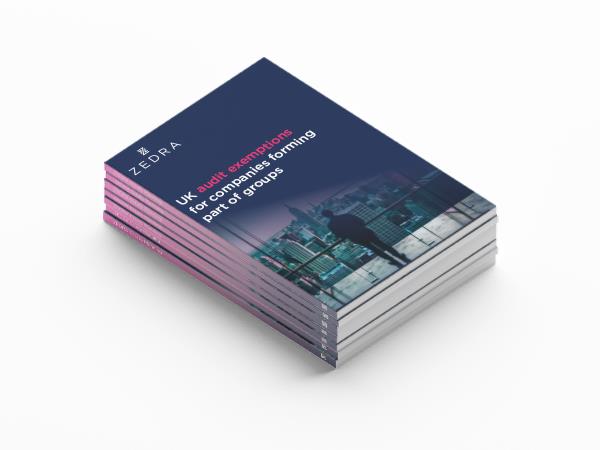UK Audit Exemptions for Companies Forming Part of Groups
08 August 2025
- Contact Adam Wildbore
- Senior Audit Director
- [email protected]
- +44 75 9702 0702

UK subsidiaries that form part of a group are often unsure about UK subsidiary audit requirements — when a statutory audit is required under UK law and how the rules apply.
In this article, ZEDRA’s Adam Wildbore and Ed Wallis explain when UK subsidiaries must prepare statutory audits, outline the key size-based and activity-based exemptions under UK law, and highlight common pitfalls via a practical case study.
Statutory Audit Requirement and Size Thresholds (Periods Ending After 1 April 2025)
All UK companies are required by law to undergo a statutory audit unless they meet specific exemption criteria tied to size. These criteria apply both to the individual UK subsidiary and to the wider group of which it forms a part, whether that group is UK-based or international.
For financial periods ending after 1 April 2025, a company can claim audit exemption only if the UK company or its worldwide group doesn’t exceed any two of the following three thresholds:
| Threshold | Limit |
| Worldwide turnover | £15 million |
| Balance sheet total | £7.5 million |
| Average headcount | 50 employees |
Turnover is pro-rated for periods longer or shorter than 12 months, whereas employee numbers are not pro-rated in the same way. Companies in a group that do not use GBP (£) as their reporting currency have their balance sheet numbers converted into GBP (£) at the relevant prevailing exchange rate at the reporting period end and their turnover is converted into GBP (£) at the average exchange rate for the period.
It is our experience that most UK subsidiaries of internationally owned groups will exceed at least two of these limits and therefore will require a statutory audit.
Activity Based Exclusions: When a Subsidiary Is Ineligible
Even if size thresholds are met, certain categories of company cannot claim audit exemption. A UK subsidiary is ineligible if it is any of the following:
- A public company
- An authorised insurance company, banking company, e-money issuer, a Markets in Financial Instruments Directive (MiFID) investment firm, or a Undertakings for Collective Investment in Transferable Securities (UCITS) management company
- A company carrying on insurance market activity
- A scheme funder of a Master Trust scheme
- A member of an ‘ineligible group’
Group Companies That Are Ineligible for Exemption
A UK subsidiary will lose exemption if at any point during the financial year it belongs to an ineligible group. An ineligible group includes any entity (UK or non-UK) that is:
- A publicly traded company or a corporate body whose shares are admitted to trading on a UK regulated market
- A person authorised under Part 4A of the Financial Services and Markets Act 2000 (c.8) to carry out a regulated activity
- An e-money issuer
- A small company that is an authorised insurance company, banking company, MiFID investment firm, or UCITS management company
- A scheme funder of a Master Trust scheme
Case Study: Group Ultimately Owned by a US Company
The below example illustrates common pitfalls for an internationally owned group when they mistakenly believe they are not required to have their UK subsidiary audited.
| Entity | Turnover | Gross Assets | Employees |
| Alma Inc (US parent) | $120 million | $70 million | 250 |
| Be UK Limited | £2 million | £1 million | 15 |
On its own, Be UK Limited would classify as ‘small’ and would not require an audit. However, because its parent company, Alma Inc, breaches two of the size thresholds, Be UK Limited is considered part of a ‘large’ international group and must be audited in the UK. In addition, no ‘parent-guarantee’ audit exemption applies since Alma Inc is not UK-domiciled.
Other commercial factors may override any audit exemption and mean Be UK Limited requires an audit, for example:
- Shareholder agreements of Alma Inc may require an audit of Be UK Limited
- Be UK Limited may have borrowings and requirements from lenders may stipulate an audit
- The company is a material component of a wider group and group auditors request Be UK Limited is audited
Audit Exemptions for UK-Only Group Companies: Section 479A Parent Guarantee
UK subsidiaries of any size, with a UK parent established under UK law, may wish to consider audit exemption by ‘parent-guarantee’ exemption if they satisfy all of the following:
- The UK parent company is required to give a guarantee over the subsidiary
- All non-controlling shareholders in the subsidiary also consent to the exemption
- The subsidiary is included in the parent’s consolidated audited accounts
- Those consolidated accounts, filed at Companies House, disclose that the subsidiary is audit-exempt by virtue of the s479A parental guarantee
Excluded from this option are traded companies and certain regulated financial entities such as authorised insurers and banks. Although the ultimate UK parent must still audit its consolidated financial statements, however the above exemptions are in place to help reduce some regulatory burdens on the subsidiary companies.
Practical Next Steps
1. Assess your group’s global turnover, assets, and headcount against the statutory thresholds at year-end.
2. Identify any public, regulated, or Master Trust-related entities that eliminate exemption eligibility.
3. For wholly UK-owned structures, evaluate the feasibility of a parent-guarantee exemption under section 479A.
4. Factor in commercial requirements from shareholders, lenders, and group auditors when determining audit needs.
How ZEDRA can help
Our team of corporate and global expansion experts in the UK have considerable experience in providing audit, assurance and advisory services across a diverse portfolio of UK companies and multinational businesses. To find out more about all aspects of statutory or voluntary audits in the UK or for advice on corporate compliance, contact Adam Wildbore or Ed Wallis.
Frequently Asked Questions
A UK subsidiary may need a statutory audit if it exceeds UK statutory thresholds, undertakes activities that make it ineligible, or cannot rely on an exemption. UK subsidiary audit requirements are assessed for the company and, where relevant, the wider group. Some groups may use a section 479A parent guarantee.
For periods ending after 1 April 2025, exemption generally applies only if the company and, where relevant, its worldwide group do not exceed any two of three measures: worldwide turnover £15m, balance sheet total £7.5m, and average employees 50. Turnover is pro‑rated, employee numbers are not.
An ineligible group includes any entity (UK or non-UK) that is a publicly traded company or a corporate body whose shares are admitted to trading on a UK regulated market; a person authorised under Part 4A of the Financial Services and Markets Act 2000 (c.8) to carry out a regulated activity; an e-money issuer; a small company that is an authorised insurance company, banking company, MiFID investment firm, or UCITS management company; or a scheme funder of a Master Trust scheme
Where a UK parent is established under UK law, a subsidiary may claim audit exemption if the parent gives a guarantee, all non‑controlling shareholders in the subsidiary consent, the subsidiary is included in audited consolidated accounts, and those filed accounts disclose the exemption. Traded and certain regulated entities are excluded.
The same tests apply, but thresholds may be assessed at worldwide group level. A UK subsidiary that is small on its own may still require an audit if its international group exceeds the limits. Section 479A is only available where the parent is established under UK law.

UK Audit Exemptions for Companies Forming Part of Groups
You can view our guide here.